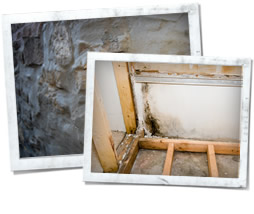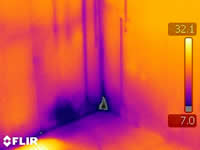



416-820-2090
information@thewaterproofer.ca

Click here to see our
HomeStars Reviews |
|
what is waterproofing?
Waterproofing is simply that - a process designed to ensure that no water enters into whatever it is you want to keep dry. The Waterproofer specializes in residential exterior waterproofing - that is, making sure the basement of your home stays dry.
If you have moisture in your basement, most likely you have one or more leaks in the foundation of your home. The Waterproofer can help by stopping water from penetrating through your basement walls, keeping water outside of your home and controlling moisture levels in your basement.
Why is My Basement Leaking?
 Over time, most basements will leak. Each major component of your home (your roof, windows, exterior walls, plumbing, etc.) has a certain lifespan and needs maintenance over the years in order to keep it functioning the way it was intended to. Your foundation is no different. Over the years, the asphalt or tar based compounds on exterior of your basement foundation start to fail. Your house settles, and cracks develop in the basement foundation. Tar and asphalt is not elastic and cannot bridge the cracks that develop. Over the years, weeping tile, which normally surrounds your basement foundation, becomes plugged with silt, roots and/or debris, which allows ground water to build up next to your foundation. Water naturally flows to the lowest point, and if it cannot be taken away by the weeping tile, it will find cracks in your basement foundation and get into your basement. Over time, most basements will leak. Each major component of your home (your roof, windows, exterior walls, plumbing, etc.) has a certain lifespan and needs maintenance over the years in order to keep it functioning the way it was intended to. Your foundation is no different. Over the years, the asphalt or tar based compounds on exterior of your basement foundation start to fail. Your house settles, and cracks develop in the basement foundation. Tar and asphalt is not elastic and cannot bridge the cracks that develop. Over the years, weeping tile, which normally surrounds your basement foundation, becomes plugged with silt, roots and/or debris, which allows ground water to build up next to your foundation. Water naturally flows to the lowest point, and if it cannot be taken away by the weeping tile, it will find cracks in your basement foundation and get into your basement.
Once water has found it way in, the situation will only get worse. Our Canadian climate, which can have several "freeze and thaw" cycles in a year, is not helpful when it comes to cracks in basement foundations. Since water expands when it freezes, each crack in your basement foundation can be worsened by each freeze. Then when there is a thaw, the crack is just that much bigger, allowing even more water to penetrate your basement foundation. Eventually, the structural integrity of your basement foundation can be destroyed.
Can I Afford to Waterproof my Basement?
Actually, the question is, can you afford not to waterproof your basement? For most people, their home is their biggest single asset. A leaking foundation leads to a wet basement which can lead to tens of thousands of dollars in damage and ultimately decrease the overall value of your home.
If your basement is wet, it is almost a certainty that you have one or more cracks in your basement foundation. The foundation itself will need to be repaired and waterproofed to stop water from getting in the future. The least expensive way to do this is to address the situation as soon as you notice or suspect that you may have a leak in your basement. Ignoring the problem will only make it worse. If your basement has leaked once, it will leak again - guaranteed. Perhaps you noticed some dampness in your basement at one point in time, but then it went away. Don't be fooled into thinking that the problem has somehow resolved itself. The usual explanation in such a case is that a crack has developed elsewhere in your basement foundation and the water is simply entering your basement elsewhere, somewhere you can't notice as easily. Over time, excess moisture in your basement can allow mold to grow, which can damage the wood portions of the structure of your home, which can be very costly to repair - not to mention the damage to furniture, flooring and carpets inside your basement.
For more information on the process The Waterproofer uses for exterior basement waterproofing, see our page The Process of Waterproofing.
interested in learning more?
health concerns
- Excess moisture can cause mold, fungus or mildew to grow
- Certain molds can be harmful to your health
- Not all molds are dangerous
- Mold need four components to grow; oxygen, mold spores, organic material and water
Find Out More > |
|
blog
Read the Latest > |
|

